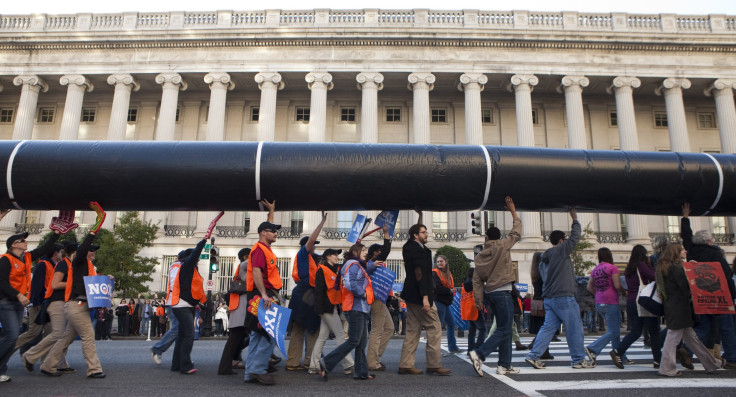Keystone XL Pipeline's Climate Change Impact Could Be Four Times Worse Than US Estimates, New Study Says

Updated on 8/12/14 at 3:00 p.m. EDT to include comments from TransCanada Corp.
The proposed Keystone XL could have four times as much global warming impact as previously assumed, a new analysis concludes. The finding comes as President Obama weighs the project’s climate effects in his final decision on the Canada-to-Texas pipeline.
Researchers said the U.S. State Department didn’t take into account that the added oil from the pipeline would lower global oil prices – by about $3 a barrel – and drive up consumption, which in turn would boost greenhouse gas emissions worldwide. All of those factors would ultimately increase pollution by as much as 110 million tons of carbon dioxide a year – or four times the 30 million tons that the State Department calculated in its environmental impact statement in February.
“The sole reason for this difference is that we account for the changes in global oil consumption resulting from increasing oil sands production levels, whereas the State Department does not,” wrote authors Peter Erickson and Michael Lazarus, Seattle-based scientists at the Stockholm Environment Institute, a nonprofit research organization. Their report was published this week in the journal Nature Climate Change.
A spokesman for TransCanada Corp. (NYSE:TRP), the pipeline's builder, noted that the authors had previously published their conclusions in a November 2013 working paper. “There is really nothing new here, other than an attempt by professional opponents to repeat old misinformation in the hope that they can delay Keystone XL,” Shawn Howard said in an email sent to International Business Times and other media outlets on Tuesday.
Howard also pointed to a Monday op-ed by Canadian economist Andrew Leach, who argues that the Stockholm Environment Institute report would “fail Economics 101.” “KXL isn’t really a level shift in the supply curve, and thus the authors don’t actually make the case for there to be any global price effect associated with the pipeline," Leach wrote.
If built, the Keystone XL would carry 830,000 barrels of oil a day from Canada’s oil sands region down to Steele City, Nebraska, where it would connect with an existing southern leg that runs to refineries on the Texas Gulf Coast. The State Department is authorized to approve the $5.3 billion pipeline because it crosses international borders, but Obama is expected to make the final call.
In June 2013, Obama announced that greenhouse gas emissions are a key factor in his decision, saying he would approve the project only if “it does not significantly exacerbate the problem of carbon pollution.”
Environmental groups have long contended Canadian oil sands crude is more carbon-intensive than conventional sources, but Erickson said that “an even bigger impact of expanding oil sands production” would be its influence on the global oil markets, he told Canada’s Postmedia Network.
Outside experts not connected to the report gave the findings mixed reviews, according to the Associated Press. The American Petroleum Institute, the industry’s main lobbying group, said the study was “irrelevant” because Canadian crude would be shipped by rail if not by pipeline. Richard Tol, an economist at the University of Sussex, pointed out that an increase of even 110 million tons of carbon is “merely a drop in the bucket” compared to the 36 billion tons of carbon that the world released into the atmosphere last year, the AP noted.
Other researchers welcomed the report, even as they acknowledged that the numbers will be hotly contested. Mark Jaccard, a sustainable energy expert at Simon Fraser University in Vancouver, called it a “sound analysis” that points to “a flaw” in the State Department’s assessment of Keystone’s impact on greenhouse gas emissions, Postmedia Network reported.
The Obama administration is unlikely to issue a decision until later this year or beyond. In April, the president said he would delay his decision because of a Nebraska state court decision that invalidated the pipeline’s route through the state. The Nebraska Supreme Court said it will review the case in September.
© Copyright IBTimes 2024. All rights reserved.











